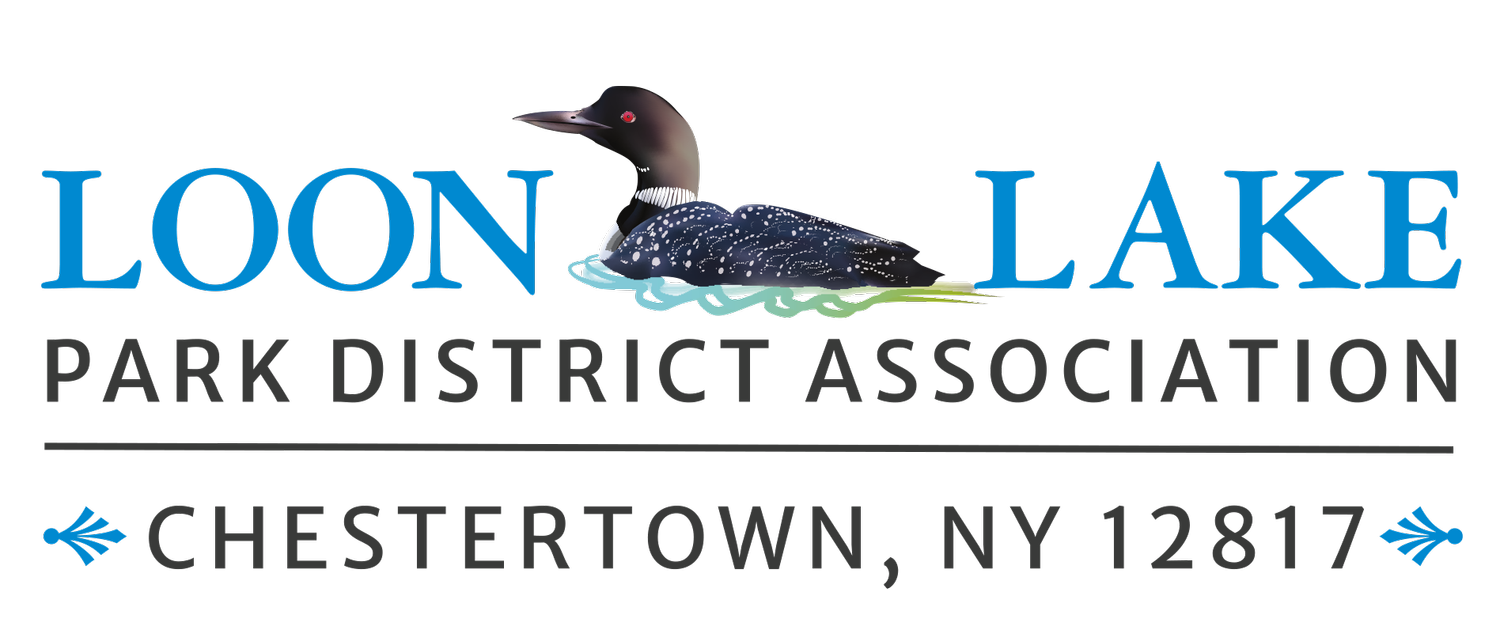LLPDA Partnership with the Adirondack Center for Loon Conservation Continues
Every year on the third the Saturday in July, the Adirondack Center for Loon Conservation (ACLC) recruits volunteers from the lakes across the Adirondacks to participate in the NY Annual Loon Census. From 8:00 AM to 9:00 AM, volunteers head out to their assigned lake with a map in hand to record the number of Adult Loons and their Chicks as well as their exact location on the Lake. This summer will mark the LLPDA’s fifth year of taking part in this event. On average, Loon Lake has been the summer home to five Adult Loons and at least one Chick. In summer of 2019 and 2021, the lake community was fortunate to witness a mating pair raise two chicks.
Across the Adirondacks, loons face many threats, some natural and some caused by humans including:
Loss of nesting habitat due to shoreline development
Human disturbance of loon nests
Injuries due to fishing line entanglement, boating accidents, predation, and fighting with other loons
Flooding of nests due to water level changes from climate change related torrential rain events, or hydroelectric reservoir management
Lead poisoning from accidentally eating lead fishing tackle
Environmental pollutants, including mercury and flame retardants, that accumulate in the aquatic food web
Avian diseases and parasite
Last year, the LLPDA and the lake volunteers worked with the ACLC to become a Certified Adirondack Loon- Friendly Lake. The work will continue this summer season as we promote and sponsor community-based environmental stewardship to better protect loons and their aquatic habitats. By working together, Loon Lake Park District residents and visitors can help minimize and address many of the challenges to better protect the loons and our lake that they share with us and other wildlife.
This is Lucy. Four summers ago, she was found on our lake with a fishing line wrapped around her neck and beak preventing her from eating and diving. Dr. Nina Schoch from the ACLC conducted a night rescue and was able to free her from the entangled fishing line and remove the hook that caused her to lose part of her tongue. She was tagged and placed back in the water to join her mate. Lucy was fortunate, as entanglement in fishing lines can cause a slow and needless death.
Fortunately, this environmental problem is easy to solve.
Yes, fishing lines get caught on the bottom of our lake on things other than fish. Please, simply pull up as much of the line as you possibly can before cutting it. If you are out on the lake, and find fishing line along the shoreline, under water or stuck in trees, logs, or other places, please pick it up and recycle it in one of Loon Lake’s fishing line recycling containers. Please feel free to deposit any lead tackle you may have, we guarantee that it will be disposed of properly.
Thanks to the following community partners, last summer five fishing line recycling containers were installed by volunteers around the Lake. We are pleased to add Chester Shore this season to our list of partners.
Loon Lake Deli
Town of Chester Public Beach fishing Area Loon Lake Marina
Loon Lake Club, the container is in the cove across from the Loon Lake Heights Beach
Clarkson Road Extension, the container is located off the northern entrance of Clarkson Road at the entrance of Beach Lot D
Chester Shores, the container is located on the main beach on a pavilion post

